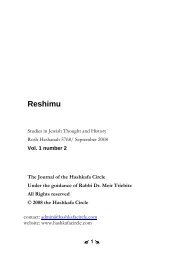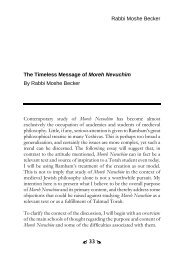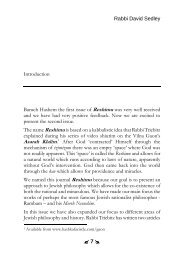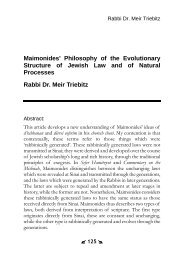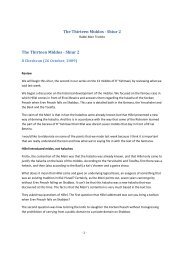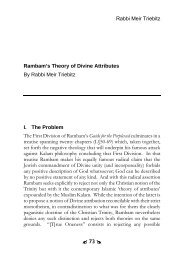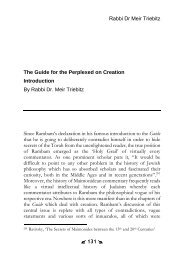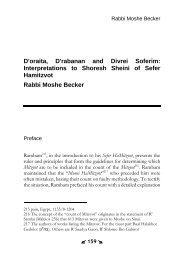Reshimu_3_journal_no.. - Hashkafa Circle
Reshimu_3_journal_no.. - Hashkafa Circle
Reshimu_3_journal_no.. - Hashkafa Circle
You also want an ePaper? Increase the reach of your titles
YUMPU automatically turns print PDFs into web optimized ePapers that Google loves.
Rabbi Moshe Becker<br />
particular contingency that may result in the person’s missing<br />
Mincha.<br />
We <strong>no</strong>w need to determine which opinion the Halacha should follow.<br />
Are we to follow the usual rule that the Halacha follows the final<br />
opinion 29 and rule like R’ Acha bar Yaakov, the later opinion in the<br />
Gemara, or is there a greater degree of authority to the stama degemara?<br />
Regarding this question there is an interesting discussion<br />
amongst the Rishonim.<br />
According to Tosafot, we do indeed apply the usual rule, however the<br />
final word in this Gemara is <strong>no</strong>t R’ Acha bar Yaakov’s, the opinion<br />
recorded last in the Gemara, but rather the stama de-gemara, which is<br />
to be taken as the opinion of R’ Ashi. As the compiler of the<br />
Gemara, R’ Ashi’s opinion most certainly qualifies as the “last word”<br />
and his ruling is authoritative despite being recorded first in the<br />
Gemara, and this does <strong>no</strong>t violate the general rule to follow the last<br />
opinion 30 . On the other hand, the Rif simply rules like the opinion of<br />
R’ Acha bar Yaakov, without elaborating. The Rosh explains that in<br />
this case the a<strong>no</strong>nymous statement is <strong>no</strong>t a real stama de-gemara and<br />
<strong>no</strong>t the words of R’ Ashi, but rather the opinion of a<strong>no</strong>ther<br />
participant in the discussion. This opinion was later rejected in favor<br />
of R’ Acha bar Yaakov’s whose solution was deemed superior 31 .<br />
Yet if we assume that the stama de-gemara as a rule is <strong>no</strong>t the words of<br />
R’ Ashi, but rather an earlier compilation, we avoid the entire<br />
question. The stama in this Gemara is <strong>no</strong> different than in any other<br />
29 This is k<strong>no</strong>wn as “hilchata ke-batra”. This generally applied rule assumes that the<br />
opinion recorded later in the Gemara is in fact the opinion of a chro<strong>no</strong>logically<br />
later Amora who considered all the earlier opinions and decided between them, and<br />
is therefore considered to have the “last word”.<br />
.תוס ' אלעשה 30<br />
וכן ... 31<br />
ד"ה בתספורת של בן<br />
נראה לרבינו יונה דשינויא קמא שינויא דחיקא הוא דהא דקתני במתניתין לא ישב אדם לפני<br />
הספר בסתם דחיק ומוקי בתספורת בן אלעשה ולא לאכול סתם מוקי בסעודה גדולה ושינויא קמא לאו<br />
רב אשי הוא דקאמר ליה אלא כשנשאו ונתנו בדבר בני הישיבה ועמדו בקושיא הוצרכו לתרץ בדוחק<br />
שלא יצאו חלוקים מבהמ"ד עד שמצא רב אחא בר יעקב שינויא<br />
. רויחא<br />
19



